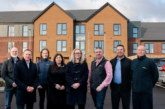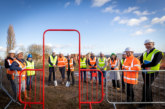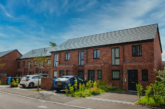 Civica’s latest survey of housing providers and residents shows a clear need for better value, safer and sustainable housing, explains Michelle Tyler, Managing Director, Housing at Civica.
Civica’s latest survey of housing providers and residents shows a clear need for better value, safer and sustainable housing, explains Michelle Tyler, Managing Director, Housing at Civica.
The future of social housing is a hot topic. In recent weeks, Prime Minister Boris Johnson announced plans for an extension to Right to Buy, the policy which allows council residents to but their home at a discount. Under the Government’s proposals, up to 2.5 million people who currently rent from a housing association, rather than the local council could now be entitled to purchase their home.
The right to have access to and live safely in an affordable home should be a given in society today. But there are concerns in some quarters that the Government’s Right to Buy extension will deplete the social housing stock available, making this less achievable for many.
We recently carried out extensive research with social housing residents and housing leaders across the UK to try to get under the skin of the big issues affecting the sector now. What we found and present in our new report, Greener homes, connected communities, is that building more affordable homes is the number one priority for housing bodies. Addressing the current shortage of homes is still a pressing focus, with an added imperative to meet net zero targets through more sustainable building practices and greener homes.
A complex housing picture
Of course, it’s not surprising that we found a wide range of challenges and goals for both residents and leaders. For example, when asked what was most important to them over the next 10-15 years, residents answered with everything from ‘more recycling’ to ‘safety of housing building materials’ to ‘mental health awareness’.
As we mark the fifth anniversary of the Grenfell Tower tragedy, it’s clear that the sector is placing greater emphasis than ever on the resident voice, encouraging people to develop a sense of ownership and contribute to the future of their housing organisation. This is proven by the increased volume of complaints to the Housing Ombudsman and legal disrepair claims, but also in resident survey. We found that the vast majority were comfortable sharing home truths and aiming to affect change through their voice.
New building safety legislation, plus the Decent Homes standards are ensuring that housing providers are held to account and will provide safe, suitable housing for residents in need. Access to joined-up data and analytics platforms will prove crucial here — helping housing providers see the bigger picture of residents and homes to provide the best services possible.
Net zero is non-negotiable
Across the UK, the housing leaders we surveyed confirmed that building more affordable homes was a top priority. But looking across the nations, there was a slightly different view, with meeting net zero targets gaining much support; dealing with the climate crisis is a huge priority. Around 14% of UK carbon emissions are caused by energy use in homes. In fact, the Climate Change Committee has recommended that all social housing meeting Energy Performance Certificates (EPC) C by 2030 be brought forward to 2028.
But is this achievable? We uncovered a big difference in confidence in meeting this goal — between residents (44% for the UK as a whole) and housing leaders (90% for the UK as a whole and 94% for their individual organisation). Perhaps this latter confidence comes from inside knowledge of the detailed and wide-spread work already underway to make the UK’s social housing stock greener. Housing bodies would do well to communicate the great progress made to date to increase resident confidence.
It may sound obvious but one of the biggest barriers is understanding what needs to be achieved. There’s lots more to consider than just meeting energy efficiency targets — it will require careful forecasting and budgeting. While we naturally turn our minds to what we could build in the future, a thorough evaluation of current stock with up-to-date asset databases will be invaluable.
An inclusive process
We also found that bringing everyone along on the journey is vital. Housing leaders confirmed that employee behaviour was the biggest barrier to becoming carbon neutral, more so than costs or system issues. So education programmes and sharing best practice from both inside your organisation and others will help better foster this green spirit.
Crucially, residents must be at the heart of this journey. Our survey suggested they are ready and willing to help. When asked about who should take financial responsibility for sustainability, they are happy to share some of the costs in areas such as energy-efficient appliances and outdoor green spaces. They are also fully behind greener technologies such as smart thermostats and energy monitors and would like to see them used more widely.
The good news is that our current snapshot of the social housing sector shows that both residents and leaders want the same thing: cheaper, safer and greener homes which are available now and scaled up to meet tomorrow’s demand. Today’s residents are keener than ever to interact digitally, which will make it easier to listen, respond and move forward as a sector for the future.









